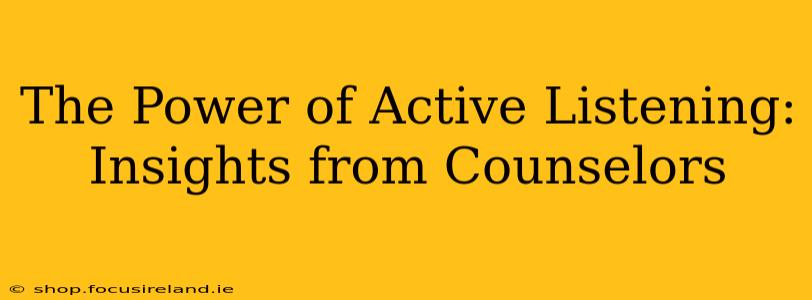Active listening. It sounds simple, doesn't it? Yet, truly mastering this skill is a cornerstone of effective communication, particularly in fields like counseling where empathy and understanding are paramount. This isn't just about hearing words; it's about deeply understanding the speaker's emotions, perspectives, and underlying needs. This article delves into the power of active listening, drawing on the expertise and experience of counselors to highlight its importance and practical application.
What is Active Listening, and Why is it Crucial in Counseling?
Active listening goes beyond simply hearing what someone is saying. It involves fully concentrating on the speaker, understanding their message, responding thoughtfully, and remembering what was said. For counselors, it's the foundation upon which therapeutic relationships are built. It fosters trust, validates the client's feelings, and creates a safe space for exploration and healing. Without active listening, counselors risk misinterpreting client concerns, hindering progress, and damaging the therapeutic alliance. It’s the difference between hearing someone talk and truly understanding them.
How Do Counselors Use Active Listening Techniques?
Counselors employ a range of techniques to demonstrate active listening. These include:
- Paying close attention to verbal and nonverbal cues: This involves observing body language, facial expressions, tone of voice, and even silences, as these often communicate as much as, or more than, spoken words.
- Reflecting feelings and summarizing: Restating the client's feelings in your own words ("It sounds like you're feeling frustrated and overwhelmed...") shows you're paying attention and understanding their emotional state. Summarizing key points helps ensure clarity and demonstrates comprehension.
- Asking clarifying questions: This prevents misunderstandings and encourages the client to elaborate, providing deeper insight into their experiences. Open-ended questions ("Tell me more about that...") are particularly effective in prompting detailed responses.
- Providing verbal and nonverbal affirmations: Nodding, maintaining eye contact, and using verbal affirmations ("I understand," "I hear you") convey empathy and engagement.
- Minimizing interruptions and distractions: Counselors create a space free from interruptions, focusing solely on the client and their needs. This undivided attention communicates respect and prioritization.
What are the Benefits of Active Listening for Counselors and Clients?
The benefits of active listening are multifaceted:
- Stronger therapeutic alliance: Active listening fosters trust and rapport, creating a safe and supportive environment for clients to open up and explore sensitive issues.
- Improved communication: Clearer communication leads to a more accurate understanding of the client's concerns, facilitating more effective interventions.
- Enhanced empathy and understanding: By truly listening, counselors develop a deeper understanding of their clients' experiences, leading to more compassionate and effective care.
- Increased client satisfaction: When clients feel heard and understood, their satisfaction with the counseling process increases significantly.
- Better outcomes: Studies show that active listening is correlated with improved therapeutic outcomes, leading to greater progress towards client goals.
How Can I Improve My Active Listening Skills?
Developing active listening skills takes practice and self-awareness. Here are some tips:
- Practice mindfulness: Pay attention to your own internal dialogue and distractions. Learn to focus your attention on the present moment and the speaker.
- Seek feedback: Ask trusted friends, family members, or colleagues for feedback on your listening skills.
- Observe skilled listeners: Pay attention to how effective communicators use active listening techniques.
- Practice empathy: Try to see things from the other person's perspective.
- Take courses or workshops: Many resources are available to help improve active listening skills.
Does Active Listening Mean I Have to Agree With Everything the Client Says?
No. Active listening does not require agreement. It's about understanding and validating the client's feelings and experiences, even if you don't necessarily agree with their perspectives or actions. Empathy and understanding are distinct from agreement.
Is Active Listening the Only Important Skill for a Counselor?
While active listening is undeniably crucial, it's just one piece of the puzzle. Counselors require a range of skills, including empathy, cultural sensitivity, knowledge of therapeutic techniques, and ethical awareness. However, active listening forms the bedrock upon which these other skills are built. It provides the foundation for a strong therapeutic relationship and effective interventions.
In conclusion, active listening is a powerful tool that is essential for effective counseling. By mastering these skills, counselors can build stronger relationships with clients, improve communication, and ultimately, facilitate positive change and healing. It's a journey of continuous learning and refinement, leading to a richer understanding of both the client and the complexities of human experience.

